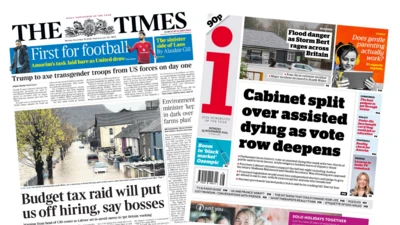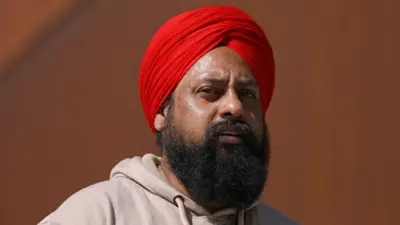We've updated our Privacy and Cookies Policy
We've made some important changes to our Privacy and Cookies Policy and we want you to know what this means for you and your data.
Programmed for survival
Image source, STV
- Author, Douglas Fraser
- Role, Business/economy editor, Scotland
It's one thing for a chief executive to leave in his own time and on his own terms (and much rarer if the boss is a she).
It's really rare to do so after taking on a company that was not expected to last as long as a decade without succumbing to structural change or hostile takeover.
STV Group chief executive Rob Woodward's approach to the job he is standing down from after 10 years has appeared relaxed while very focused. He stripped away the remaining parts of what had been Scottish Media Group.
The company has stopped harking back to its launch, 60 years ago, when Scottish Television was described by its founding chairman as as "a licence to print money".
It had to become less of a couthy institution.
With the fracturing multi-channel TV audience, a commercial Scottish channel carrying its regulatory requirements seemed like it would be buried by ҙуПуҙ«ГҪ competition, dependence on ITV content, the arrival of more nimble commercial competition, and a financial crash that took down much of its advertising revenue.
It has not been an easy path. The relationship with ITV went badly wrong for a while. Woodward gambled on refusing to take expensive ITV drama, and had to admit defeat.
The demise of police drama Taggart as a money-earner has yet to be replaced. The drive towards becoming an independent producer for other channels has been bumpy and fallen short of expectations.
Image source, Geograph
But STV has survived, and is in fairly robust health - the only part of the channel 3 network that is independent of ITV.
It has refocused on its online news and entertainment, learning quickly that the plan to go hyper-local with hundreds of parish pump news sites was not going to work, and changing tack.
Its video-on-demand is growing by 23% in the first five months of this year.
Scotland Tonight has been a notable success, seeing off its ҙуПуҙ«ГҪ rival in the same time slot.
And Woodward has taken the opportunity of new licences for local TV, deftly turning them from city stations into a new national network, and beating the ҙуПуҙ«ГҪ to an integrated TV news programme.
STV2, launched on Monday, may not be quite the spirit intended when the licences were handed out. It may not have much of a budget. But so far, it's been proving a smarter business than others who won the right to give local TV a try.
Activist investor
Ten years is often seen as an appropriate time for a chief executive to move on, for reasons of good governance.
But one other reason why Mr Woodward may be thinking of getting out of his Clydeside office is the appearance among his shareholders of an investment fund called Crystal Amber.
It has just raised its stake to 14% of STV shares. That's in addition to 21% of shares in Johnston Press.
Why? Richard Bernstein, who runs the fund from London and Guernsey, isn't saying. But Crystal Amber is an activist investor.
As Ashley Highfield is finding at Johnston Press in Edinburgh, its interest in a stock may help support the price, but it can also be a warning of turbulence ahead.
Top Stories
More to explore
Most read
Content is not available








